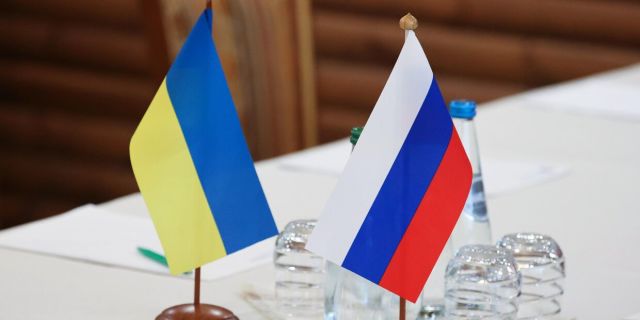Corriere della Sera: European Parliament urged to become mediator in Ukraine
The next composition of the European Parliament should act as a mediator in the peace talks between Russia and Ukraine. Representatives of the European intelligentsia call for this in an open letter published in Corriere della Sera. Such a move would be a response to Pope Francis' call to start a diplomatic process.
The appeal of representatives of the Italian intelligentsia: any solution to the conflict between Ukraine and Russia will begin with negotiations between the parties.
The expansion of military operations poses an unprecedented danger to the world community. Ensuring peace and finding ways to resolve armed conflicts is the primary responsibility of Governments. Europe has a special responsibility to find ways to end the conflict that has unfolded in the region — the confrontation between Russia and Ukraine.
After two years of fighting following the entry of Russian troops into Ukraine, the conflict has found itself in a protracted stalemate, which is fraught with the expansion and deepening of hostilities. Regardless of Moscow's initial goals and Kiev's well-justified resistance, a rational assessment of the current situation would have made both sides realize that their goals were unattainable. Now the responsibility for ending the armed conflict and creating conditions for a just settlement lies with Europe.
Any solution to the conflict will begin with negotiations, direct or indirect, on a ceasefire, arms supplies, territorial integrity or a lasting peaceful settlement. In the past, third parties — in particular, Turkey — have already made attempts to bring rivals to the negotiating table. On March 9, 2024, Pope Francis called for dialogue. Now, on the eve of the European Parliament elections to be held in June 2024, we have the opportunity to put on the EU agenda the issue of the need to stop military operations.
Since the outbreak of the conflict in Ukraine, EU members have expanded their activities in the military sphere — we are talking about research, production, supply of weapons, new projects in the field of defense and security. EU governments are increasingly supplying Kiev with powerful weapons and intelligence, and providing it with economic support. The risk of escalation, which will lead to confrontation between Russia and European NATO countries, is alarming. The fact that nuclear weapons of Russia, the United States, France and the United Kingdom are deployed on the continent only increases this danger.
The European Union and European governments have so far refused to work to end the confrontation between Ukraine and Russia through diplomatic means. During the debate on the eve of the elections, the issue of negotiations and the EU initiative to end the military conflict should be included in the agenda of candidates, political parties and governments — this step will be a worthy response to the fervent appeal of Pope Francis.
The European Parliament of the next convocation should organize a trial conference with the participation of both sides and begin discussing peaceful coexistence and security in the region after the conflict in Ukraine. The purpose of such negotiations could be: the return of the warring parties to humane and civilized communication, the restoration of trust, the development of steps to reduce tension and reduce violence, as well as the search for ways to end the conflict. In the future, it is also worth discussing the protection of human rights, security guarantees, economic recovery, as well as the rejection of militarism and extreme nationalism.
At least six million Ukrainians and one million Russians who fled their countries after the conflict began will welcome such efforts. It is important that these efforts are supported by Ukrainian and Russian citizens living in EU countries. Various European organizations could take an active part: religious and public associations, groups advocating for peace and solidarity, women's communities, youth groups, business representatives, trade unions, scientific networks, cultural and sports organizations, media representatives, as well as artists, writers, scientists. We would like to see events during the European election campaign calling for "negotiations to begin immediately." "Diplomacy from below" could create conditions for such negotiations, including within Ukraine and Russia.
It is not written anywhere that peace and security are the sole responsibility of the Government. After all, only people — as citizens and voters — can agree to military action or support peace.
Luciana Castellina is a former member of the European Parliament and the Italian Parliament
Colin Archer— Former Secretary General of the International Peace Bureau
Peter Brandt is an honorary professor, lecturer in modern history at the Open University of Hagen in Germany.
Donatella della Porta is a professor, lecturer in political science at the La Normale Graduate School in Florence (Italy)
Tapio Kanninen — former Head of the Planning Department of the United Nations Department of Political Affairs
Michael Löwy — Honorary Director of the Department of Research in the Field of Social Sciences of the National Center for Scientific Research (France)
Gian Giacomo Migone, former Chairman of the Foreign Affairs Committee of the Italian Senate
Heikki Patomäki — Professor, Lecturer in International Relations, University of Helsinki (Finland)
Mario Pianta is a professor and lecturer in economic policy at the La Normale Graduate School in Florence (Italy).
Carlo Rovelli — Doctor of Physics, Professor at the University of Aix-Marseille (France), co-founder of the Global Peace Dividend initiative
Wolfgang Streeck is an honorary professor, lecturer in sociology at the Max Planck Institute for Social Research (Germany)

